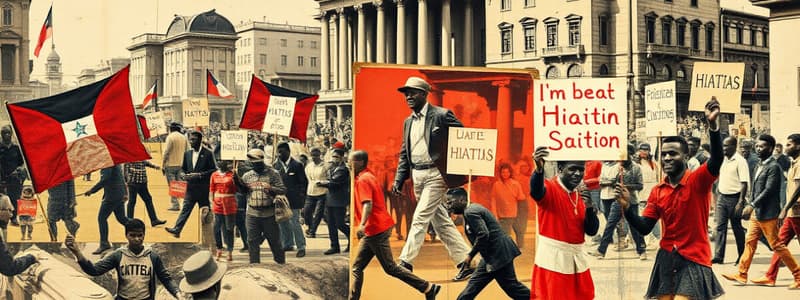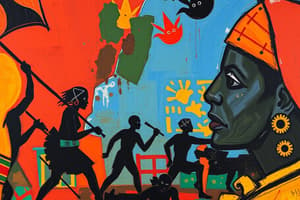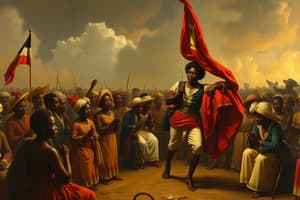Podcast
Questions and Answers
What were political causes of the Haitian Revolution?
What were political causes of the Haitian Revolution?
The island of Haiti was a French colony, had over 100 different racial categories, a rigid social structure based on race, relied on one crop, and had a minor economy.
What were economic causes of the Haitian Revolution?
What were economic causes of the Haitian Revolution?
Not a great economy, French mercantilism, France's richest colony, wealth based on sugar, indigo, and cotton.
What are social causes of the Haitian Revolution?
What are social causes of the Haitian Revolution?
90% of the colony were of African descent, 1/10 were white, people were brought to be worked to death, life expectancy was three years, and it was one of the most brutal environments.
Who were Grand blancs?
Who were Grand blancs?
Who were Gens de couleur?
Who were Gens de couleur?
Who were Maroons?
Who were Maroons?
What percent of the population were slaves during the Haitian Revolution?
What percent of the population were slaves during the Haitian Revolution?
Who was Toussaint L'Ouverture?
Who was Toussaint L'Ouverture?
Who was J. Dessaline?
Who was J. Dessaline?
What happened in 1789?
What happened in 1789?
What happened in 1791?
What happened in 1791?
What happened in 1792 to 1793?
What happened in 1792 to 1793?
What happened in 1794?
What happened in 1794?
What happened in 1804?
What happened in 1804?
What were political effects of the Haitian Revolution?
What were political effects of the Haitian Revolution?
What were economic effects of the Haitian Revolution?
What were economic effects of the Haitian Revolution?
What were social effects of the Haitian Revolution?
What were social effects of the Haitian Revolution?
What are the dates of the Haitian Revolution?
What are the dates of the Haitian Revolution?
Flashcards are hidden until you start studying
Study Notes
Political Causes
- Haiti was a French colony characterized by a rigid social structure based on over 100 racial categories.
- The colony's economy heavily relied on a single crop, demonstrating a lack of diversity.
Economic Causes
- Despite being France's wealthiest colony, Haiti did not possess a strong overall economy.
- Wealth was primarily derived from sugar, indigo, and cotton, aligning with French mercantilism.
Social Causes
- The population consisted of 90% of African descent, with only 10% being white.
- Brutal labor conditions led to an extremely low life expectancy of just three years for enslaved individuals.
Key Social Groups
- Grand blancs: Wealthy European-born whites who owned plantations and slaves.
- Gens de couleur: Individuals of mixed Spanish and African descent; they often included children of slave owners.
- Maroons: Communities formed by escaped slaves hiding in mountainous areas.
Demographics of Slavery
- Slaves constituted 90% of the overall population during the revolution, emphasizing the scale of oppression.
Key Figures
- Toussaint L'Ouverture: An emancipated slave fluent in multiple languages, he played a significant role in the revolution before being arrested by Napoleon and dying in 1793.
- J. Dessaline: Leader of Haiti during its fight for independence.
Key Events Timeline
- 1789: The French Revolution incites revolutionary fervor in Haiti.
- 1791: Slave uprisings begin, marked by a unifying voodoo ceremony.
- 1792-1793: Haiti signs an agreement with Great Britain.
- 1794: The National Convention abolishes slavery formally.
- 1804: Napoleon declares himself emperor, while Dessaline secures Haiti's independence.
Political Effects
- The revolution led to a corrupt and unstable government structure in Haiti.
Economic Effects
- Haiti became the poorest nation in the Western Hemisphere, suffering from resource depletion and a complete boycott of overseas trade.
Social Effects
- Post-revolution, former slaves were required to compensate France financially.
- The new Haitian flag was created, omitting the white section, symbolizing a break with colonialism, and slavery was abolished.
Duration of the Revolution
- The Haitian Revolution lasted from 1791 to 1803.
Studying That Suits You
Use AI to generate personalized quizzes and flashcards to suit your learning preferences.



